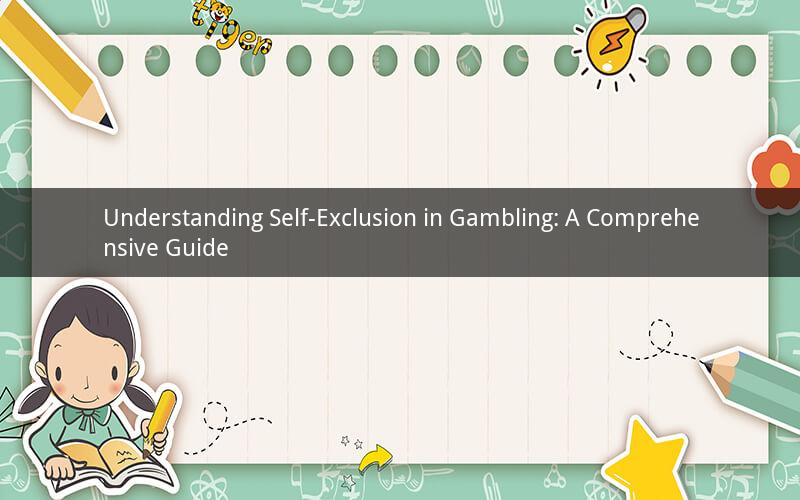
Introduction:
Gambling has become a prevalent form of entertainment and leisure activity for many individuals. However, for some, it can lead to addiction and severe consequences. One of the measures implemented to address gambling addiction is self-exclusion. In this article, we will delve into the concept of self-exclusion in gambling, its purpose, and the benefits it offers.
What is Self-Exclusion in Gambling?
Self-exclusion in gambling refers to a process where individuals who are struggling with gambling addiction voluntarily restrict their access to gambling venues and online platforms. It is a proactive approach aimed at helping individuals regain control over their lives and break the cycle of addiction. By excluding themselves from gambling environments, individuals can take a significant step towards recovery and personal growth.
Purpose of Self-Exclusion
1. Preventing Relapse:
One of the primary purposes of self-exclusion is to prevent relapse. When individuals who are prone to addiction are surrounded by tempting gambling opportunities, it becomes increasingly challenging to resist the urge to gamble. By self-excluding themselves from gambling venues and websites, individuals create a safer environment that minimizes the risk of relapse.
2. Encouraging Recovery:
Self-exclusion serves as a powerful motivator for individuals seeking recovery. It helps them establish boundaries and reinforces their commitment to breaking the cycle of addiction. By removing the temptation, individuals can focus on healing, attending therapy sessions, and developing healthy coping mechanisms.
3. Providing Support:
Self-exclusion provides individuals with a sense of control and autonomy over their recovery journey. It also allows them to seek support from loved ones, therapists, and support groups. By being proactive and taking control of their addiction, individuals can build a strong support network that aids in their recovery process.
Benefits of Self-Exclusion
1. Reduced Financial Strain:
Gambling addiction often leads to significant financial problems, including debt and financial ruin. By self-excluding themselves from gambling environments, individuals can minimize their financial losses and take the first step towards rebuilding their financial stability.
2. Improved Mental Health:
Gambling addiction can have severe consequences on mental health, leading to issues such as depression, anxiety, and stress. Self-exclusion helps individuals focus on their mental well-being by providing a safe and supportive environment to heal and recover.
3. Strengthened Relationships:
Addiction can strain relationships with family and friends. By self-excluding themselves from gambling environments, individuals can rebuild trust and strengthen their relationships, leading to a more fulfilling social life.
4. Enhanced Self-Esteem:
Overcoming addiction is a challenging process, but it can significantly boost self-esteem. Self-exclusion helps individuals acknowledge their struggles and take responsibility for their actions, leading to a greater sense of self-worth and accomplishment.
5. Reduced Risk of Crime:
Gambling addiction can lead to illegal activities, such as theft and fraud, to fund gambling habits. By self-excluding themselves, individuals reduce the risk of engaging in criminal behavior and contribute to a safer society.
How to Enroll in Self-Exclusion Programs
1. Research Local Self-Exclusion Programs:
Contact local gambling operators, government agencies, or support organizations to inquire about self-exclusion programs available in your area. Research the programs thoroughly to ensure they meet your specific needs.
2. Fill Out the Application:
Once you have found a suitable self-exclusion program, gather the required documentation and fill out the application form. This may include personal identification, proof of gambling addiction, and any relevant medical or psychological reports.
3. Submit the Application:
Submit the completed application to the self-exclusion program administrator. Follow any additional instructions or requirements provided by the program.
4. Attend a Confirmation Meeting:
After your application is approved, you may be required to attend a confirmation meeting. This meeting serves as an opportunity to discuss the self-exclusion process, the terms and conditions, and any other relevant information.
5. Receive Confirmation and Support:
Upon completing the confirmation meeting, you will receive confirmation of your self-exclusion status. This may involve receiving a membership card or identification document that proves your exclusion. Additionally, you may be provided with resources and support to assist you during your recovery journey.
Frequently Asked Questions
1. Can I self-exclude from all gambling venues and online platforms?
Yes, self-exclusion programs are designed to restrict access to all gambling venues and online platforms. However, it is crucial to research the specific terms and conditions of each program to ensure comprehensive coverage.
2. Can I reverse my self-exclusion?
Self-exclusion is a voluntary decision, and in some cases, individuals may choose to reverse their exclusion. However, the process may vary depending on the program and may require a formal request and review.
3. Is self-exclusion a guarantee of recovery?
While self-exclusion is a powerful tool in the recovery process, it is not a guarantee of complete recovery. It is essential to seek professional help, attend therapy sessions, and build a strong support network to ensure long-term recovery.
4. Can self-exclusion be applied to online gambling only?
Self-exclusion programs can be tailored to exclude individuals from both online and offline gambling venues. However, the availability and effectiveness of the program may vary depending on the specific program and location.
5. Is self-exclusion confidential?
Yes, self-exclusion programs are confidential. Personal information and details regarding the individual's participation in the program are typically kept confidential and only disclosed to authorized personnel.
Conclusion:
Self-exclusion in gambling is a crucial step towards overcoming addiction and reclaiming control over one's life. By understanding the purpose, benefits, and process of self-exclusion, individuals can take proactive measures to seek recovery and lead a fulfilling life free from the clutches of gambling addiction.